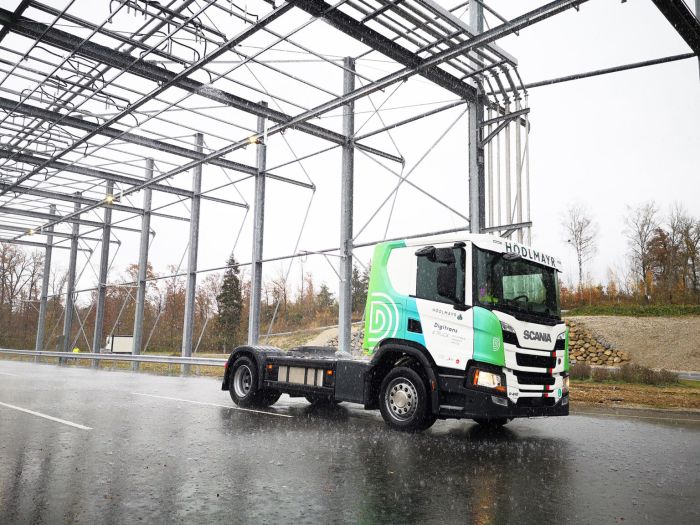
(Photo © DigiTrans GmbH)






Overview
DigiTrans GmbH has developed a vehicle test track where they can produce controlled rain events, which are extremely useful in testing vehicle performance under various weather conditions. To provide an accurate and extensive real-time data set of the test track's weather conditions, DigiTrans GmbH and Campbell Scientific teamed up to install a state-of-the-art road weather station.
"The Campbell Scientific solution we have installed at the proving ground for automated driving in St. Valentin provides us with vital weather data to make analytical decisions better and faster. We now have reliable data for the development of automated vehicles and driving functions in different artificial and natural weather conditions.”
—Christoph Feichtinger, DigiTrans GmbH
The Challenge
Autonomous vehicles and vehicles with assisted driving must be thoroughly tested to verify their system performance and interactions with the road surface under varying conditions and circumstances—including weather conditions that typically impact the behavior of human drivers. For autonomous vehicles and vehicles with assisted driving, safety assurance and automated decision-making in adverse weather conditions require extensive and rigorous testing. Such testing is ideally conducted in realistic, yet controlled conditions; however, these conditions can be challenging to recreate.
The Solution
Understanding the challenge posed, DigiTrans GmbH set forward a groundbreaking project: to develop and construct a vehicle test track with its own rain system and the ability to replicate specific types of rain events. In St. Valentin, Austria, at the DigiTrans Test Center for automated driving on the proving ground of Magna Powertrain Engineering Center Steyr, engineers constructed an outdoor rain plant that measures 100 meters (328.1 ft) long, six meters (19.7 ft) wide, and 10 meters (32.8 ft) high. The rain plant became operational in October 2022 and uses an outdoor irrigation system to generate different droplet sizes and amounts of precipitation, including three precipitation intensities ranging from 10 to 100 mm/h (0.39 to 3.94 in./h).
To have the most accurate and complete ambient weather and road data, DigiTrans GmbH and Campbell Scientific worked together to deploy a high-accuracy road weather information system (RWIS) that measures all relevant ambient and road conditions at this novel test track, including the following:
- Visibility
- Precipitation intensity and type
- Wind temperature, direction, and gusts
- Air temperature
- Relative humidity
- Dew point
- Solar radiation
- Present weather
- Road temperature
- Road conditions (dry, damp, wet, icy, snowy)
- Friction indication
- Presence of de-icing chemicals
- Water film height
The RWIS station not only adheres to, but exceeds, the standards used across Europe by national highway authorities for weather and road-condition measurements. Therefore, this RWIS station provides reliable data that is directly comparable with data collected by RWIS stations in Europe and across the globe.
A Wintersense Internet of Things (IoT) smart sensor has been deployed on another portion of the test track to collect additional road surface temperature (RST) data, as well as air temperature, relative humidity, and dew point data. The Wintersense sensor is easily moved to different locations along the track, according to the needs of each project. For example, the sensor is used to understand the road and ambient conditions close to or further away from the outdoor rain system, as well as to examine long-term variations in different areas of the track (for example, cold or warm spots dependent upon shadows from buildings or trees).
The DigiTrans Test Center for automated driving currently facilitates the testing of a wide variety of autonomous driving functions in adverse weather conditions, as well as autonomous driving (AD) and advanced driver assistance systems (ADAS) tests.
End users of the test track now have access to a unique set of data that allows for detailed analysis and a deep understanding of all conditions and factors at play, removing unknown variables from their research. The data also allows for better extrapolation of performance data at the test track and on actual roads where the vehicles will be put to the real-world driving test.
The Benefits
- Real-time, 24/7 access to an extensive set of weather-related and surface-condition parameters for the proving ground's clients and researchers
- Access to live measurements and historical records from everywhere within the DigiTrans GmbH intranet network
- Ability to accurately extrapolate data to real-world conditions
- Increased confidence in test results
- All required information for a site-specific road weather forecast and nowcast
- Ability to easily measure other portions of the proving ground by repositioning the Wintersense smart sensor
- A future-proof system that can be expanded with additional sensor technologies